“But your efforts — coupled with a continuing commitment by everyone else to mask up, wash up and keep themselves and others safe — will hopefully turn the tide.”


“But your efforts — coupled with a continuing commitment by everyone else to mask up, wash up and keep themselves and others safe — will hopefully turn the tide.”
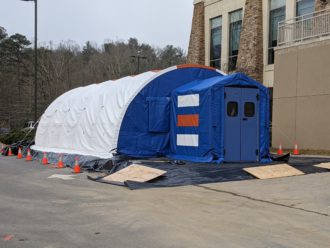
Early data suggests monoclonal antibody therapies may reduce hospitalizations in people at high risk for severe COVID-19 complications by 70%. Limited supplies are now available in Western North Carolina.

“If it was truly perceived as an emergency, then I think we would be doing more and talking about it more,” says Asheville City Council member Kim Roney, who was elected in November on a platform that included a local Green New Deal and rapid renewable energy deployment.


“Human beings just aren’t designed to be isolated in perpetuity,” says Rhonda Cox, executive vice president and chief population health officer at Vaya Health. But that’s exactly what many have had to endure over the past 10 months, and the strain is showing up in the region’s mental health system.

Research from China, Italy and the United States indicates that anywhere from 50% to 80% of those who contract COVID-19 still experience symptoms of what’s come to be called “long COVID” many months after the initial infection with the virus. Xpress talks to patients and health care providers to understand how the phenomenon is affecting lives in Western North Carolina.
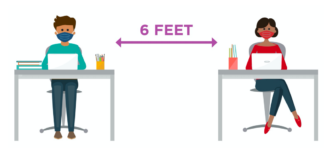
New policies from the N.C. Department of Health and Human Services and the N.C. Department of Public Instruction recommend all elementary schools open for in-person learning under Plan A, which does not require 6-foot social distancing between students and teachers. Middle and high schools are encouraged to reopen in-person under Plan B, which requires 6-foot social distancing at all times.

Of Buncombe County’s roughly 1,600 employees, 465 are currently working remotely, and 283 have said they would continue to do so indefinitely if allowed. If those employees remained remote, the county would need about 22,700 fewer square feet of office space, allowing for more services to be consolidated in fewer buildings.
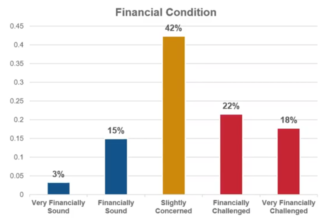
“I think we’re failing our community if we don’t get that $3 million out there,” said Andrew Celwyn, a member of the Buncombe County Tourism Development Authority board and owner of downtown Asheville’s Herbiary retail shop, in reference to a pot of money the authority had successfully used to support tourism businesses last year.

by Irene Olds

On Tuesday, Feb. 2., the Buncombe County Board of Commissioners will vote on accepting a U.S. Department of the Treasury grant for emergency rental assistance. the funds would support households financially hurt by the pandemic with rent, utilities and and other expenses related to housing.
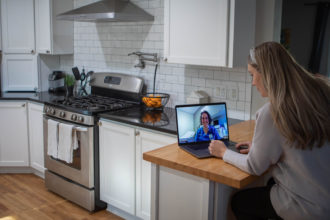
Telehealth was already on the rise pre-pandemic, but COVID-19 has made it the new normal. Patients are ditching crowded waiting rooms en masse, opting to talk to providers from the privacy of their home.

“Our biggest problem right now is that millions of people want a shot, but we only have hundreds of thousands of doses,” said Gov. Roy Cooper at a Jan. 27 press conference. “There will be a time when everyone can get one, and we want to make sure everyone can access it as quickly as possible.”

“I feel that they have failed our children and their families, in keeping the children virtual for almost a year now.”


“Hospitality and culinary professionals are being mandated and regulated out of business for the sake of optics and at the senseless sacrifice of hardworking people and their families.”

While county relief has heretofore been available only in the form of low-interest loans, businesses will now be able to seek grants of $5,000 to hire or rehire employees at a living wage. Staff had previously believed such a grant program to be illegal but had since received updated guidance from the UNC School of Government.

Market managers and vendors at the markets participating in the Appalachian Sustainable Agriculture Project’s Double SNAP initiative, which matches Supplemental Nutrition Assistance Program benefits dollar-for-dollar on edible items, saw SNAP transactions nearly triple from 2019 to 2020, and 80% of responding vendors said they’d experienced sales growth due to the program.

As of Jan. 21, more than half a million doses of the COVID-19 vaccine had been distributed throughout the state, although supplies remain far lower than demand.

Retired Rear Adm. Richard Houck of Transylvania County, attorney Fred Jones of Macon County and Bishop José McLoughlin of Henderson County will join the board of Western North Carolina’s largest nonprofit as Buncombe County’s Dr. John Ball departs. The change fulfills requirements stipulated in N.C. Attorney General Josh Stein’s approval of Mission Health’s sale to HCA Healthcare.
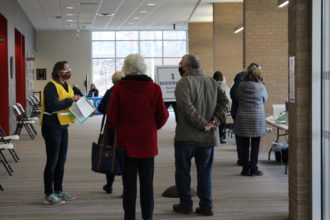
COVID-19 vaccination initiatives announced by the county include a drive-thru site for second doses at A. C. Reynolds High School and a waitlist for first-dose vaccination appointments. The waitlist will replace a system that requires residents to schedule appointments directly as vaccines became available.